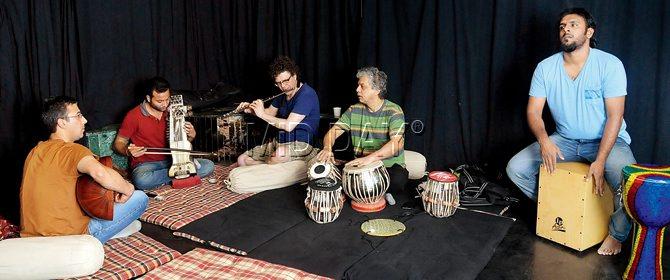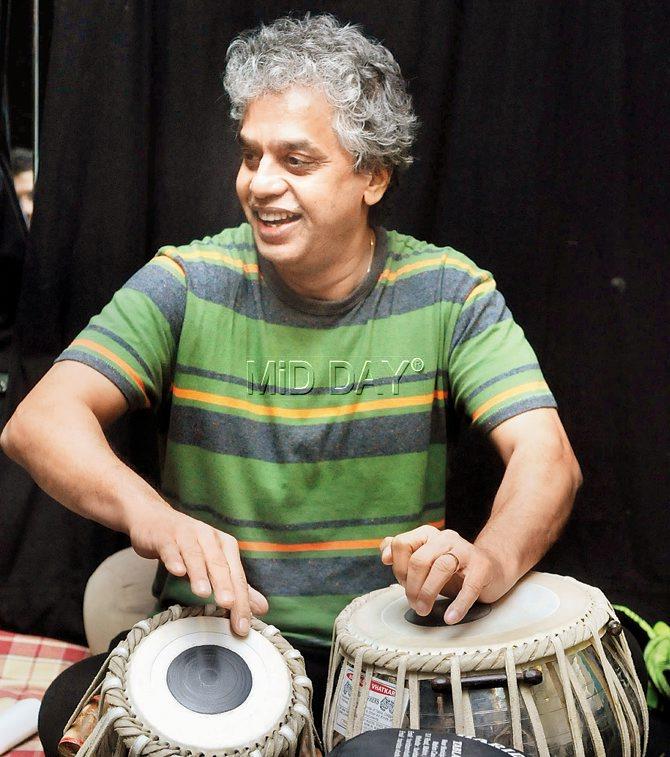Tabla player Fazal Qureshi pays tribute to his father, the legendary tabla maestro Ustad Allarakha, on his 96th birth anniversary with the musical show, The Journey Continues. It will feature musicians from India, the Middle East and Europe and highlight the commonality of various forms of music

Oud player Ahmad Al-Khatib, sarangi player Sabir Khan, saxophonist Andres Hagberg, tabla player Fazal Qureshi and percussionist Varun Sunil.
The legendary tabla maestro Ustad Allarakha Khan was a disciple of Mian Kader Baksh from the Punjab Gharana. A celebrated exponent of this style, Ustad Allarakha was the first-ever Indian Classical artiste to be bestowed with a gold disc for a Classical recording. He received several other awards including the Padmashree and the Sangeet Natak Akademi Award. But apart from being the most celebrated exponent of this style, in his lifetime, Ustad Allarakha was also revered for being a great teacher and father.
ADVERTISEMENT

Oud player Ahmad Al-Khatib, sarangi player Sabir Khan, saxophonist Andres Hagberg, tabla player Fazal Qureshi and percussionist Varun Sunil. Pic/Nimesh Dave
To mark his 96th birth anniversary, his son Fazal Qureshi is hosting the annual tribute concert, The Journey Continues. The show will feature seven artistes from India, the Middle East and Europe, including Qureshi, santoor player Rahul Sharma, saxophonist Andres Hagberg, oud soloist Ahmad Al-Khatib, guitarist Sanjay Divecha, sarangi player Sabir Khan and multi-percussionist Varun Sunil.
The musicians will put up an instrumental performance of tabla, oud, saxophone and flute to create a blend of Indian ragas and rhythm, Middle Eastern Makam, Swedish Folk and European Jazz. The concert will also combine Indian and Arabic Classical music.

Fazal Qureshi, musician
Carry it forward
Qureshi informs that the show emphasises on how the guru's teachings are always carried forward. "Your guru may not be alive, but he is alive through you and your performances, you take forward his teachings and thus, the journey continues," he shares.
Qureshi adds that the highlight will be a collaboration between Indian Classical music and Arabic Classical music, which will be presented in the first half of the concert. "There are lots of meeting points and we will be exploring them. There will be strains from the oud (an Arabic instrument), the saxophone and the flute (which are Western Jazz instruments) and the sarangi and tabla (which are Indian instruments), thus representing each style of music and connecting three worlds," he says.
Commenting on the similarities between Indian Classical music and Arabic Classical music, he mentions that they both use micro tunes (which Indian Classical musicians call shrutis) and both are based on a melodic scale (which Indian Classical musicians call raga and Arabic Classical musicians call Makam). "There is a lot of improvisation that happens in both styles of music. Besides, Indian music also has a lot of Persian influence in its style; instruments like the sitar, sarod and tabla have a Persian origin," he observes.
Speaking about the abiding memories he has of his father and guru, Qureshi reminisces, "He was a great teacher and father and gave us the freedom to do whatever we wanted. We were not told that we had to learn to play the tabla or pursue music. We went through the grind of academics. I finished my BA and did a few years of law while carrying on with my musical training. My father was an open-minded and freedom loving person who believed in equality. He was teaching me along with his other students but he would not teach me more just because I was his son. I carry it on when I am teaching my students."
On: May 13, 7 pm at St Andrew's Auditorium, Bandra (W).
Call: 26410926
Entry: Free
 Subscribe today by clicking the link and stay updated with the latest news!" Click here!
Subscribe today by clicking the link and stay updated with the latest news!" Click here!






